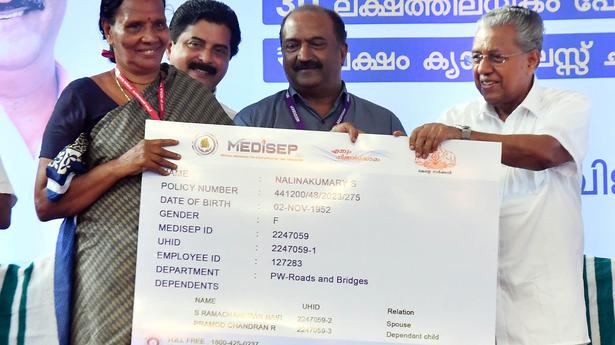
Govt. role crucial in social security, says CM
The Hindu
Medisep, health insurance scheme for govt. staff and pensioners, launched
Stressing the role of the government as a model employer providing social security, Chief Minister Pinarayi Vijayan said the Left Democratic Front (LDF) had been putting forward an alternative policy to the notion that governments should withdraw from welfare activities. He was speaking after launching Medisep, the cashless health insurance scheme for State government employees and pensioners, here on Friday.
The scheme is expected to benefit more than 30 lakh people, including government employees, pensioners and their families, teaching and non-teaching staff of aided schools and colleges, and part-time contingent employees. It envisages cashless treatment facility to beneficiaries through an insurance company and a network of empanelled hospitals for a basic benefit package of ₹3 lakh per annum for the policy period of three years.
"This is the next big step in the government's aim towards ensuring universal health coverage and also towards improving the quality of life in Kerala to a level similar to mid-income countries in the next 25 years. Ensuring health of the public is an important factor in ensuring social security. The financial stability of many families has been destroyed due to high treatment costs. Although we have an excellent public health system, which provides quality treatment at lower costs, quite a few will still have to face high treatment costs. It is the responsibility of the government to provide them security," said Mr. Vijayan.
He said that at least one hospital with facilities, including organ transplantation, has been empanelled in each district as part of Medisep. The government will pay the entire premium amount annually to Oriental Insurance Company, which is implementing the scheme. Later, a premium of ₹500 will be deducted each month from the salaries and pensions of the employees as premium. The government will also maintain a corpus fund for emergency treatment in non-empanelled hospitals as well as for more expensive treatment, including organ transplantation.
“Some vested interests in the insurance sector have tried to kick up a controversy around the project. They claimed that the annual premium is only ₹5,664, while the employees are being made to pay ₹6,000 per year. The allegation was that the government is pocketing the remaining ₹336 from each employee. This remaining amount goes to the corpus fund of the scheme. The employees and pensioners are getting such a beneficial scheme with wide coverage because of the involvement of the government,” he said.
Finance Minister K.N. Balagopal, who presided over the scheme, said a large number of senior citizens in the State would benefit from the scheme. The empanelling of more hospitals, including from other States, is progressing. The scheme will also address the difficulties for the elderly in getting an insurance, he said.













